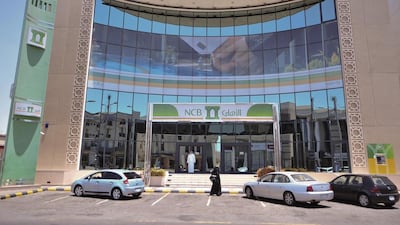Saudi Arabia’s commercial banking sector will recover in 2018 and beyond, boosted by improving economic confidence leading to a rise in deposits, while lower interest rates and funding costs will lift the industry overall, according to two reports.
“The concomitant uptick in deposits will enable banks to expand their asset bases without posing risks to sector stability, which will also be supported by strong asset quality and capital adequacy,” said BMI Research, a Fitch Group company.
The “worst is now past” for banks in the kingdom, which in April 2016 recorded the largest 12-month decline in deposits since August 1994 on the back of a slowdown in economic growth and fiscal adjustments amid persistent low oil prices.
Saudi banks, alongside their Arabian Gulf peers, suffered from a dip in profitability and asset quality in the last few years due to the slide in oil prices from the mid-2014 peak of $115 a barrel. As the economy faltered, loans turned into bad debt that prompted some banks to allocate more provisions, a move that hurt their earnings. But the recovery in oil prices that touched $80 a barrel last week is set to help lift profitability at Saudi and other regional banks.
Improving macroeconomic conditions and rising oil prices are supporting demand for consumer and private sector credit, and encouraging businesses to gradually resume expansion plans, BMI Research’s latest industry update said.
Commercial banks’ asset growth is forecast to accelerate to 3.5 per cent in 2018 from 2.2 per cent in 2017, and 4 per cent in 2019, the report said. The government will remain a key source of asset growth as it continues to borrow from domestic banks to fund fiscal deficits.
BMI Research noted that the slump in oil prices had caused a modest deterioration in loan repayment, but said it remained “broadly optimistic” over asset quality in the kingdom. The non-performing loans ratio has modestly increased to 1.6 per cent in 2017 from 1.1 per cent in 2014 and is one of the lowest in the region.
"Given our expectations for economic activity to pick up in 2018 and the following years, we do not expect further significant deterioration in asset quality,” BMI Research said.
Steady deposit growth, robust capital adequacy ratios and strong asset quality are set to support overall sector stability. Saudi banks reported a 7.5 per cent year-on-year increase in aggregate net profit in the first quarter of 2018, mainly due to lower interest expenses and provisioning charges, according to a Moody’s update this week.
_______________
Read more:
Saudi banks to see credit-positive recovery in 2018, says Moody’s
HSBC, RBS’s Saudi affiliates strike early merger deal
UAE’s largest banks to see 'solid' profits this year despite rising costs
_______________
The results are “credit positive” for the industry given that the results occurred amid still-subdued economic activity in the kingdom. This has impacted credit demand with lending contracting 1 per cent year-on-year in March, Moody’s said. However, interest expenses declined 12.5 per cent year-on-year in the first quarter reflecting improved funding conditions following sustained fiscal tightening in 2016.
Saudi banks’ net interest income rose by 7 per cent due to lower interest rates, offsetting a 3 per cent growth in interest income, according to the report. However, both net interest income and interest income declined by 1 per cent on a quarterly basis, reflecting a contraction in net loans for the second consecutive quarter.
“We expect interest income generation to remain challenged given subdued lending activity, somewhat balanced by higher returns on investment portfolios and the gradual re-pricing of variable-rate assets,” said Moody’s associate analyst Jonathan Parrod in the report.
Meanwhile, non-interest income declined by 8 per cent year-on-year due to lower demand for loans, credit cards, trade and foreign exchange transactions.
In an earlier report in March, Moody’s forecast a credit-positive recovery for Saudi banks in 2018 as interest expenses decline and domestic funding conditions pick up.

